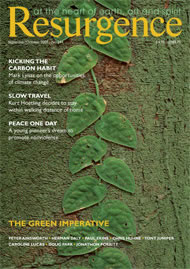CARBON TRADING IS built into the Kyoto protocol, Europe has an Emissions Trading Scheme for big polluters, and the British Government is considering personal carbon allocations that can be traded. Carbon trading is at the heart of measures to combat climate change.
Larry Lohmann questions the whole concept and argues that carbon trading has not worked, cannot work, and has been a huge distraction. “To achieve stabilisation of greenhouse gas concentrations in the atmosphere … on the basis of equity,” is the agenda that was set by leaders at the Earth Summit in 1992. Aubrey Meyer defined it as contraction of carbon emissions to what will not cause further harm, and convergence to equity in the use of the atmosphere.
However, the negotiators at Kyoto, five years later, seemed only concerned that action on climate change should not harm business; preferably that it should actually increase financial activity. They reasoned that scarcity – the atmosphere’s limited ability to handle greenhouse gases – could create monetary value that could be traded. They then lumped all emissions together – from fossil fuels, deforestation, agriculture, landfill – to create a dense fog of bureaucratic complexity. They made no distinction between luxury emissions that should be reduced urgently, and those that necessarily result from the survival activities of the poor.
American experience with sulphur dioxide is often quoted as justification for emissions trading, but these emissions come from the chimneys of a few large factories where sophisticated measuring equipment is available. Carbon emissions come from chimneys, exhausts, open fires, cookers – an inexhaustible list of outlets – and it is absurd to suggest that they can be measured with sufficient accuracy to withstand legal challenge. Christian Aid, for example, estimates that 40% of emissions from the top 100 firms in the UK are missing from their official submissions. If large companies in Britain don’t perform, how can this possibly be regarded as a system for universal application?
The Kyoto protocol also introduced Clean Development Mechanisms, Certified Emissions Reductions and Joint Implementation to help industry carry on as usual. Lohman comments, “trading in credits from offset projects would result in a world in which all the coal, oil and gas had been burned up” – and the human race extinguished.
Lohmann sets out the perverse results of a policy that has seen emissions spiralling out of control. The length of the book reflects its thoroughness, but a summary would be useful for busy decision-makers.
Lohmann comes back repeatedly to “the basic truth that most fossil fuels will have to be left in the ground”. The dominant carbon-trading theory has lost ten vital years and must be dropped from further consideration. But what should take its place?
An end must obviously be put to perverse subsidies and investments such as the World Bank’s funding of oil pipelines and the UK’s programme for roads and airports. Tax can be used to discourage damaging activities though it cannot guarantee results. Regulation is the key mechanism: it was regulation – a ban on certain chemicals – that saved the ozone layer.
If your bathroom floods, you turn the tap off. Similarly the sky is flooded with greenhouse gases, and the first need is to reduce the extraction of coal, gas and oil at source. The few companies that mine these fuels need to be targeted. Once the fuels have been extracted their carbon will be emitted somehow. Government incentives through tax or trading schemes will not, cannot reduce the emissions that result from these fuels once they have entered the economy.
Lohmann is less specific about the Earth Summit’s call for equity. I favour the suggestion that a limited number of emission-coupons should be distributed to all communities and that the extractor companies should be required to buy sufficient of these coupons to cover the emissions that result from the fuel they sell. The UK could kick-start the process by distributing its share equally to all residents and requiring importers and extractors of fossil fuels to buy them. This is not a trading scheme. It is regulation of the fossil fuels entering the economy, by allocating an equal share, and hence an equal benefit, to all citizens.
Carbon Trading is free of charge for single copies. It can also be downloaded free from www.dhf.uu.se







